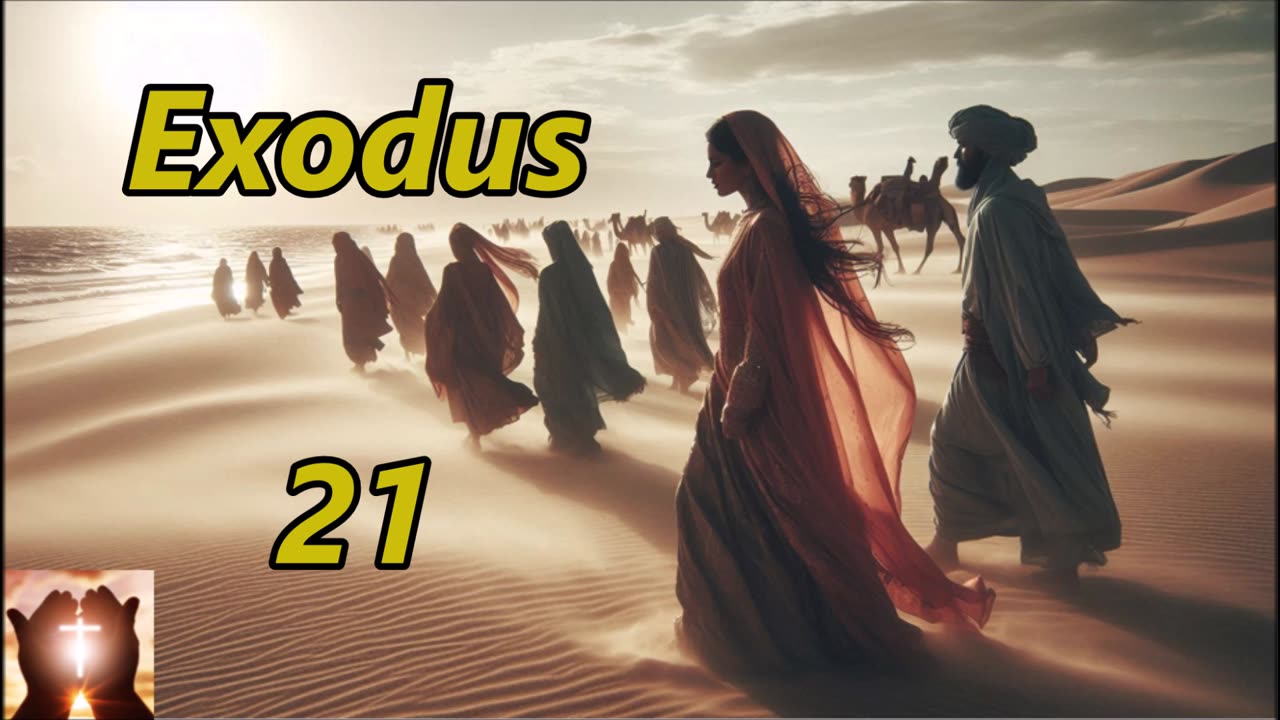Premium Only Content

Exodus 21
1. Laws Regarding Servants (Verses 1–11):
Hebrew servants were to serve for six years and be freed in the seventh (v. 2).
If married upon entering servitude, the spouse left with them; if married during servitude, the spouse stayed (v. 3–4).
A servant could choose to stay permanently out of love for the master, marked by piercing the ear (v. 5–6).
Special protections were provided for female servants, especially concerning marriage and rights (v. 7–11).
Key Lesson: God values justice, dignity, and freedom even in systems of servitude—highlighting ethical treatment and human value.
2. Laws Concerning Violence (Verses 12–27):
Intentional murder was punishable by death; unintentional killing led to sanctuary (v. 12–14).
Striking or cursing parents was a capital offense (v. 15, 17).
Injuring others led to proportionate justice—“life for life, eye for eye…” (v. 23–25).
If a servant was harmed by a master (e.g., lost an eye or tooth), the servant was freed (v. 26–27).
Key Lesson: These laws emphasize proportional justice and personal accountability, rejecting both vengeance and exploitation.
3. Laws Concerning Animals (Verses 28–36):
If an ox killed someone, the ox was killed; if the owner knew the ox was dangerous, they were also held responsible (v. 28–29).
Compensation was required if an animal injured a person or another animal (v. 30–36).
Key Lesson: Responsibility extended even to property, promoting community safety and accountability.
Themes and Applications:
Justice and Mercy: These laws promoted fairness and curbed abuse.
Human Dignity: Even servants and the injured had rights and protections.
Responsibility: Everyone was accountable for their actions and the impact on others.
-
 1:11:31
1:11:31
Flyover Conservatives
11 hours agoThe “J Walker” Secret: One Daily Habit That Shifts an Entire City - Tammy Hotsenpiller | FOC Show
42.7K2 -
 2:12:02
2:12:02
Mally_Mouse
8 hours ago🎮Throwback Thursday! Let's Play: Wii Sports Resort!
38.1K2 -
 LIVE
LIVE
Akademiks
4 hours agoATLANTA IS BACK. Young Thug and YFN best buddies now. ATL backs Thug officially!
1,264 watching -
 5:40:35
5:40:35
Reolock
6 hours agoWoW Classic Hardcore | 3 LEVELS REMAIN
36.8K3 -
 3:00:23
3:00:23
Sgt Wilky Plays
5 hours agoThirst Trap Thursday | Regiment Donor Drive
31.2K -
 4:12:29
4:12:29
Fragniac
6 hours ago🔴 LIVE - FRAGNIAC - THE FINALS - IT'S ABOUT TO BE A MOVIE❗🎬📽 🎞
23.9K2 -
 1:39:44
1:39:44
Glenn Greenwald
7 hours agoJames Comey Indicted; TikTok and CBS Taken Over by IDF Funder Larry Ellison; Republicans Blame Rhetoric for Violence: Is "Stochastic Terrorism" Real? GOP Blocks Release of Epstein Files | SYSTEM UPDATE #521
143K83 -
 LIVE
LIVE
StevieTLIVE
5 hours agoThursday SOLO Warzone Domination | BDAY at Midnight
31 watching -
 10:34:47
10:34:47
FoeDubb
11 hours ago🏰KINGDOM MENU: 🎮WASTELAND SHENANIGANS ON DA 1ST BORDERLANDS DILLY DILLY!!!!
8.17K -
 15:57
15:57
Robbi On The Record
9 hours ago $0.54 earnedTranshumanism: Are Humans Becoming Obsolete? Neuralink & CRISPR explained
12.1K5